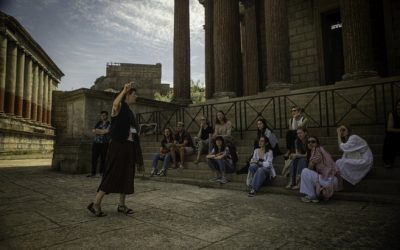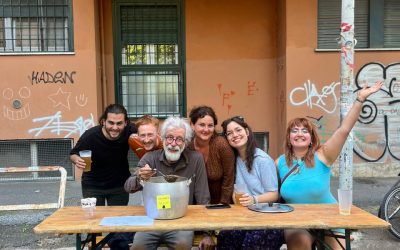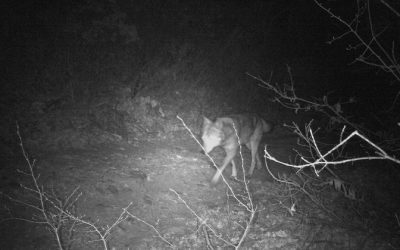Education
Banana bread unites people online!
Long term volunteering
Written by Lili Stepchenko from Ukraine
How to repeat the success of the online project? In my opinion, you should prepare together banana bread online, have the most productive team and very motivated participants to create a positive base for implementing the second successful online Work- and Studycamp “Female Perspectives on Police Brutality and Forced Labour in WWII” together with Memorials Gestapokeller and Augustaschacht and SCI-Germany. As the projects dates were 26.02 – 12.03.2021, I still have fresh impressions and experience to share with you!
Personally I did digital logistics: I started Zoom meetings, did all break-out rooms and tried myself as a DJ when we had pauses. Also I did all the negotiation with the volunteers of the online workcamp before the start of the project and was a technical support during the whole workcamp duration. It was a new role for me, where I did my best because I wanted my team work smoothly and keep up with the planned time and activities. Also, I translated the live interview that was given by a forced labour witness and this was also unforgettable experience.
But the highlight of this camp was the congratulations with the birthdays among which there was mine. I was given the most precious gifts ever – banana bread sent by post and a nice video with very sweet wishes from volunteers. Frankly speaking, I would have never thought that a parcel with a tasty bakery would make me so happy and smiley during the rest of the day and bring me in high spirits! I think even with this changed times we can make warm-hearted presents to each other – mine is to have such a noble team with whom it’s an honour for me to work with.
Before I share the feedback of our participants, I would like to share with you a journey through our online workcamp created by one of our camp coordinators. My advice would be to sink into the story deep so that you can have an image of how the workcamp was going on:
“On Friday 26 of February we opened the zoom link for the first time. Maybe we waited a bit before entering the main session. And we were there, we’d started! We saw many faces on the screen. Maybe some of them were new for us, maybe some were already familiar. We started to learn more about this online workcamp. New responsibilities, new information, new technical possibilities and methods. We learnt more about each other and the experiences of others.
Saturday. We were already familiar with the procedure of entering the Zoom meeting and with the faces we met there. We listened to the presentation about SCI. After that we played the game “Let’s get to know each other”. We moved from one room to another. Or maybe not. And then later after the session we got our first task to listen to the interview for the first time.
Sunday was a day off. But still we were connected with others with the chat sharing the photos of what was around us.
Monday, March 1. The day when the work started. We learnt how and why people became part of forced labour camps. Then we started our guided tour to Augustaschacht and Gestapokeller and right away we were in the labour education camp Ohrbeck. Short break and then we learnt how to interview people and we did it on our own.
Tuesday, we were getting deeper in the topic. We got more answers on how women were part of forced labour camps. We saw a part of the interview of one of the survivors, analysed it and then we were divided into two groups according to our task. After that we spoke about a social event and open space together.
Wednesday, it was already the fifth day of the camp, time was flying fast. We were heard that we wanted more interaction with others, so we were now a part of that question-answer game, moving from one Zoom room to another Zoom room and asking a funny question sent by our camp coordinator.
Thursday was opened by the first of birthdays, we sang, we wished something good, we smiled and laughed. Also that day we not only shared what we’d done or found out but also got in touch with other people who were trying to keep history. We were not alone in this. We listened to other historians and even saw the interview as a part of ongoing research. Then we relaxed after that day and smelled our favourite aroma during the reflection session. And the day wasn’t over. After the main session we prepared a surprise card for Karina.
Finally, it was Friday. The first week was almost over. We congratulated Karina, smiled, showed our love and joy. We prepared questions for the interview with a woman who had gone through a forced labour camp. We had two days off but also we got an assignment to find women’s representation in our towns. The day was over but we met with others later and cooked in Zoom banana bread and played some quiz.
It was Monday again, March 8 – a perfect day for the topic we were studying. We were sharing or listening to others when they were showing what they’d found. Later we connected with our inner self when we draw our biography tree or tree of life.
Tuesday. On that day we met Antonina, the contemporary witness. But first, the surprise video for Lili, we’d been working on it during the weekend but tsss. And then the talk. Many questions, many answers which brought more questions.
Wednesday. We shared our impressions about the talk with the group and then collaborated to finish our task. After that it was time for open space. We dived into history and listened to resistance songs and then went back to present and got to know a country some participants were from.
Thursday. The big day. We were working for that day to see how everything would become the whole. There were difficulties but we managed to complete everything. We presented timelines, created three trees of life of three survivors.
Friday. It was March 12. Last camp day. Time flew by so fast. We did the final evaluation rounds, and started to prepare the farewell party which was very atmospheric with Mafia game and costumes in gangster style.”
The online workcamp is always a big challenge, it demands a lot of preparation but it is also very rewarding. As part of the Memorial team it is our task to provide participants with information and guide them through the tasks. However much information we provide there is always just as much we learn from the participants. How history is perceived, commemorated in different national contexts, new ways of thinking, working and socialising online.
– Nina
I hope you liked our journey through online workcamp. Now it’s high time for the feedback from our participants!
Looking back, I understand how lucky I was to have an opportunity to participate in such amazing project. In three words, it was interesting (extremely!), productive and inspiring! I could not imagine that a digital camp will be so useful for both sides; participants and the organization. So I learn a lot of information amount Forced labour and female perspective in labour camps during WWII, the information, that I could not find by myself. Also, we did a lot of practical things concerning Oral history, for me it was really useful to apply my theoretical knowledge about this method in practice. For that I thanks the Augustaschacht memorial team – your knowledge is very valuable. I was glad to communicate with such professionals. And of course, I am grateful to SCI for the great organization of the project. I will remember this camp with warm feeling. Thank you!
– Viktoriia
When I first came to the camp I didn’t really know what to expect especially because it was online. I knew only that the topic of cultural memory and the things that happened with people during WW2 are interesting to me. I have learned more than I expected about the memorial and the contemporary witnesses and how to work with oral histories. This experience was great as it helped me learn a lot about myself as well. Thank you Rita for the biography tree workshop! 🙂
– Andriana
Even though the camp could not take place offline, we luckily had the opportunity to have a conversation with a camp-survivor, Antonina Vasilijewna Sidoruk. That was an incredible possibility to see from a personal level the suffering and hardness of a person who went through forced labor during IIWW. Another thing is learning about the representation of women in public places in different countries. That was the most awesome way to spend International Women’s day!
– Yevheniia
I’m grateful for such an opportunity to try myself in a new realm I’ve never been before, work with people from my motherland (we’re from the same country and could not easily, of course, but meet each on the street. Destiny decided that we have to get acquainted here)!
– Maria
I really learned a lot in this workcamp. I listened to all the historical input with great curiosity and the feeling to work on a bigger project motivated me to read further literature and really dig into the topic. I also learned a lot from other team members who shared their knowledge about female pioneers in their regions and gave insights in the cultural heritage of their places. Speaking to Antonina Sidoruk was really memorable, on a personal and emotional level, but also so many details that made me understand better how life was like for a female forced labourer and a Ukrainian woman of that time. Baking banana bread together was fun, it felt like a cosy evening with a lovely group of friends, despite our physical distance.
– Marie-Lena
I’m thankful for the opportunity to be in this camp!
– Sonia
It was my first study camp at all. I was nervous at the beginning. But it went well and I learned a lot. Grateful to have the opportunity to take part in this online study camp and meet many new people. The responsibilities were equally splitted to each participant of the study camp. The energizers were really activating. I learned many new methods. Referring to the historical context, I did not know how difficult it was for forced labourers to speak about their experiences after the second world war. I also learned about different perspectives on historic developments.
– Thomas
You can still join!
Want to have your own volunteer experience for peace?
Read more Voices of Volunteers




